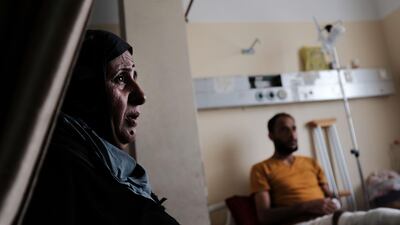In Gaza’s Al Shifa Hospital, the only welcome you get is from the sounds of support machines. Numerous wounded patients walk on crutches, others roll by in wheelchairs. Dozens of family members line the corridors, waiting for any news that can bring them comfort.
Sarry Al Shobaky, a 22-year-old Palestinian, lies motionless on a hospital bed in the intensive care unit, looking up at the white ceiling. He cannot move, only blinking to answer yes or no questions.
Located on the second floor of the enclave’s largest and oldest medical facility, the young man is now a quadriplegic, paralysed from the neck down and kept alive by a web of tubes.
_______________
Read more:
UAE tells UN: Gazans treated as lesser humans
West's failure to act in Gaza will be cause of the next massacre
UN inquiry approved into killing of 60 at Gaza fence
_______________
Sarry is one of hundreds wounded last week and one of eight serious cases in the unit, its head Dr Jehad Al Jaidi tells The National. Israeli soldiers opened fire on protesters along the territory's border fence in what Palestinian leaders called a "massacre". An Israeli bullet pierced his neck, breaking his third cervical vertebrae - located at the top of the spinal cord - before exiting.
Next to him is Yaser Habeed, 25, who can only make contact by moving his head. Questions are met by attempts to speak, but his voice never comes, only expressions of hopelessness and pain. Yaser, who was also shot in the neck by an Israeli soldier, is attached to an artificial respiration machine and is now paralysed in the legs, according to his nurse. There are no family members at his side.
Gaza’s overwhelmed surgeons say both cases are so serious they cannot operate. Sarry’s father, 55-year-old Dr Dawood Al Shobaky, calls for urgent international medical assistance to save his son from a life of disability.
"No one wants to operate on him, they are afraid to cause more damage to him," the public health consultant says, his spectacles perched on the end of his nose.
“I hope to not lose my son, that we can cure him and that he can live his life again like any other youth,” he says, fighting back tears.
His brother, 26-year-old Sajed, says Sarry was shot hundreds of feet from the Israeli border fence, and travelled to the protests for the first time to see what was happening there.
The account is one of many which indicate Israeli snipers targeted protesters far from the border fence, not only those who attempted to breach the barricade. On the day of the United States embassy move to Jerusalem, they killed 60 Palestinians, including several children.
The murders have had a devastating impact on the families and Gaza’s hospitals, similar to that of the 2014 conflict between the territory’s rulers Hamas and Israel.
“International organisations who came to Gaza confessed that the huge number of injuries transferred to Gaza's hospitals last Monday would have collapsed any health sector in any outside country,” says Ashraf Al Qudra, spokesman for the Gazan Health Ministry. Egypt and Jordan have helped with medical transfers but hundreds more need outside assistance, he says.
“We need medical crews, medicines and big specialist centres in Palestine. Our abilities can’t cover all the needs."
The territory’s infrastructure has been decimated by more than a decade of an Israeli land, sea and air blockade, as well as three wars with Israel since 2008. Last Monday, the hospital that has seen it all after three wars again worked around the clock, admitting 500 cases in just two hours and opening new operation rooms to cope with the influx.
As the chaos at Al Shifa goes on, Sarry's grandmother, 70-year-old Jamila Al Jayar, enters the room holding her paralysed grandchild. She pushes the yellow curtain separating him from his fellow victims aside, perching by his bedside. She displays a Quran, beginning to pray for his life in a hushed voice.
After Monday's bloodshed, dozens of Gazan families like the Al Shobakys will be whispering prayers for what will feel like forever.
_______________
Read more:
Mahmoud Abbas admitted to hospital for third time in a week
White House pushes ahead with Mideast peace plan
Rabat scraps twinning plan with Guatemala over Israel embassy move
_______________

